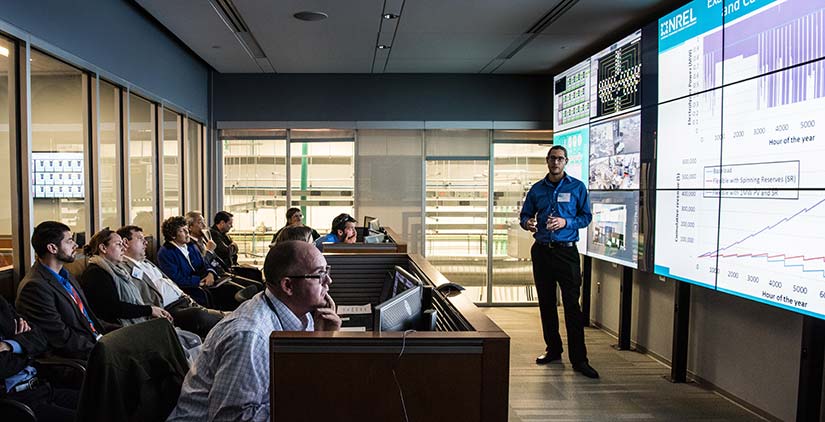Grid Standards and Codes
NREL provides strategic leadership and technical expertise in the development of standards and codes to improve the integration, interconnection, and interoperability of electric generation and storage technologies.

Performance standards are critical to building a clean and modern grid—they streamline interconnection of renewable energy resources, they create a united defense against cybersecurity threats, and they improve overall grid reliability and resilience. Standards are also a key path to industry adoption of NREL's cutting-edge research. In its standards and codes initiatives, NREL works with a range of partners, including laboratories and government agencies; electric utilities; standards development organizations; industry collaborations and organizations; universities; private companies; and state, local, and tribal governments.
Capabilities
NREL's standards team provides strategic technical leadership to develop standards that accelerate and smooth the adoption of generation and storage technologies from the household level up to the transmission system level. Using capabilities and resources at NREL laboratories, the standards and codes team excels at developing rapid simulations that take advantage of advanced concepts such as hardware-in-the-loop testing. Such methods of testing actual equipment coupled with computer simulation provide added assurance and validation of methods and solutions.
Since 1999, NREL has led the development of the Institute of Electrical and Electronics Engineers Standard 1547-2018, including the latest update in 2018.
Projects
As more distributed energy resources such as rooftop solar and electric vehicles connect to the grid, our energy system faces changing cybersecurity threats. These new interconnected and communications-enabled technologies call for laboratory-tested standards that are proven to protect against dynamic and diverse threats. NREL works across all industry, researcher, and stakeholder groups to advance cybersecurity standards for distributed energy resources and modern energy systems.
Sharp increases in photovoltaics (PV) adoption have given a sense of urgency to the standards development process. By providing leadership and direction for the full revision of interconnection standards IEEE 1547, IEEE 1547.1, and UL 1741, the Accelerating Systems Integration Standards team is addressing this urgency. The goal of this work is to accelerate the development of interconnection and interoperability requirements to take advantage of new and emerging distributed energy resource technologies, such as grid-supportive inverters and energy storage. New conformance test procedures in UL 1741 SA and IEEE 1547.1 are being validated at NREL's Energy System Integration Facility. NREL has also developed extensive resources and educational materials to educate industry and the public about IEEE 1547 and related standards.
As PV, wind, and energy storage dominate new energy generation project queues on the transmission and subtransmission systems, the need for a performance standard for bulk power system-connected, inverter-based resources has become urgent. To fill this gap, NREL is providing leadership and technical input for interconnection standards IEEE 2800 and IEEE 2800.2. The IEEE 2800 standards have the potential to be as impactful as IEEE 1547-2003—the foundational standard in interconnection of distributed energy resources.
The goal of this project is to develop streamlined and accurate methods for New York utilities to determine interconnection requirements for PV installations. The project requires collaboration with the New York Department of Public Service, New York State Energy Research and Development Authority, New York Power Authority, and New York investor-owned utilities and provides technical expertise, research, and testing methods to address grid-integration issues in New York State. Methods include providing analysis for resolving interconnection issues, developing fast screens, and identifying solutions following the paths of states such as California, Hawaii, and Massachusetts.
Publications
Fault Response of Distributed Energy Resources Considering the Requirements of IEEE 1547-2018, IEEE Power and Energy Society General Meeting (2020)
Reduced-Order Parameterized Short-Circuit Current Model for Inverter-Interfaced Distributed Generators, IEEE Transactions on Power Delivery (2020)
Setting the Smart Solar Standard – Collaborations between Hawaiian Electric and the National Renewable Energy Laboratory, IEEE Power and Energy Magazine (2018)
Contact
Share
Last Updated March 14, 2025
